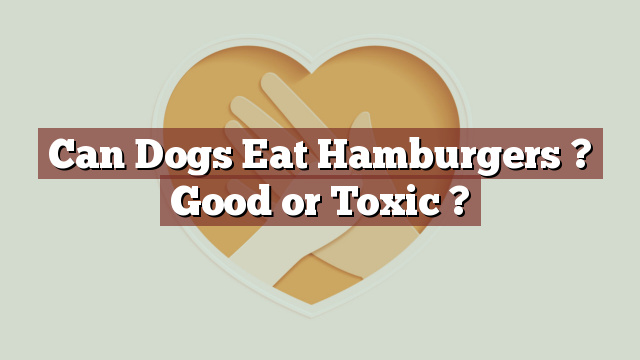Can Dogs Eat Hamburgers? Good or Toxic?
It’s crucial for pet owners to be aware of what foods are safe for their furry friends. With so many different types of food available, it’s important to know which ones can be harmful to dogs and which ones can provide them with nutritional benefits. In this article, we will explore whether or not dogs can safely consume hamburgers and analyze the potential risks and benefits associated with feeding them to our canine companions.
Nutritional Value of Hamburgers and Its Impact on Dogs’ Health
Hamburgers are typically made from ground beef, which is a good source of protein. Protein is an essential nutrient for dogs as it helps build and repair tissues, supports a healthy immune system, and provides energy. Additionally, hamburgers may contain other ingredients such as onions, garlic, and spices, which could be harmful to dogs, and should be avoided.
Are Hamburgers Safe for Dogs or Can They Be Toxic?
No, hamburgers are not safe for dogs to consume. While the protein content in hamburgers can be beneficial for dogs, the potential risks outweigh the benefits. Hamburgers are often seasoned with salt, spices, and other flavorings that can be harmful to dogs. Additionally, the fatty content of hamburgers can cause digestive issues and may lead to pancreatitis, a potentially serious condition in dogs.
It’s important to note that even plain, unseasoned hamburgers can pose a risk to dogs due to the high fat content. This can lead to obesity and other health problems over time. Therefore, it is recommended to avoid feeding hamburgers to dogs altogether.
Potential Risks and Benefits of Feeding Hamburgers to Dogs
Feeding hamburgers to dogs can have various risks and potential benefits. The risks mainly stem from the seasoning and fatty content of the meat, which can lead to digestive issues, obesity, and pancreatitis. On the other hand, the protein content in hamburgers can provide some nutritional benefits to dogs. However, it’s important to remember that there are alternative, healthier sources of protein available for dogs, such as lean meats and specially formulated dog food.
What to Do If Your Dog Eats a Hamburger and Shows Symptoms?
If your dog accidentally consumes a hamburger, it’s important to monitor their behavior and look out for any symptoms of discomfort or illness. These symptoms may include vomiting, diarrhea, abdominal pain, or lethargy. If any of these symptoms persist or worsen, it is crucial to seek immediate veterinary attention. A veterinarian will be able to provide the necessary guidance and take appropriate measures to ensure your dog’s well-being.
Conclusion: Weighing the Risks, Hamburgers Should Be Consumed Sparingly by Dogs
In conclusion, dogs should not be fed hamburgers due to the potential risks they pose. The seasoning, high fat content, and other ingredients commonly found in hamburgers can be toxic and harmful to dogs. While hamburgers may offer some nutritional value in terms of protein, it is recommended to opt for healthier alternatives that are specifically formulated for dogs. Ultimately, the well-being and safety of our furry friends should always be our top priority when it comes to their diet.
Thank you for investing your time in exploring [page_title] on Can-Eat.org. Our goal is to provide readers like you with thorough and reliable information about various dietary topics. Each article, including [page_title], stems from diligent research and a passion for understanding the nuances of our food choices. We believe that knowledge is a vital step towards making informed and healthy decisions. However, while "[page_title]" sheds light on its specific topic, it's crucial to remember that everyone's body reacts differently to foods and dietary changes. What might be beneficial for one person could have different effects on another. Before you consider integrating suggestions or insights from "[page_title]" into your diet, it's always wise to consult with a nutritionist or healthcare professional. Their specialized knowledge ensures that you're making choices best suited to your individual health needs. As you navigate [page_title], be mindful of potential allergies, intolerances, or unique dietary requirements you may have. No singular article can capture the vast diversity of human health, and individualized guidance is invaluable. The content provided in [page_title] serves as a general guide. It is not, by any means, a substitute for personalized medical or nutritional advice. Your health should always be the top priority, and professional guidance is the best path forward. In your journey towards a balanced and nutritious lifestyle, we hope that [page_title] serves as a helpful stepping stone. Remember, informed decisions lead to healthier outcomes. Thank you for trusting Can-Eat.org. Continue exploring, learning, and prioritizing your health. Cheers to a well-informed and healthier future!

